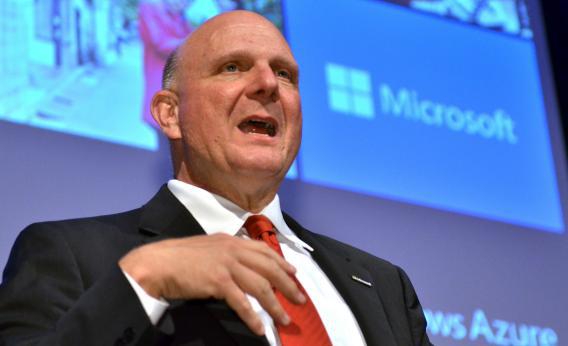One of the tech industry’s most prominent leaders is calling it quits, and investors are elated. Microsoft announced Friday that CEO Steve Ballmer will retire within the next 12 months, after helping to choose his successor along with a committee that includes chairman Bill Gates. In a statement, Ballmer said:
There is never a perfect time for this type of transition, but now is the right time. We have embarked on a new strategy with a new organization and we have an amazing senior leadership team. My original thoughts on timing would have had my retirement happen in the middle of our company’s transformation to a devices and services company. We need a CEO who will be here longer-term for this new direction.
Microsoft shares jumped 7 percent on the news that Ballmer would be stepping down. That’s understandable: The company’s stock price has been remarkably flat in the 11 years since Ballmer took the reins—not a track record that inspires a lot of investor exuberance for the future. The immediate joke on Twitter: “Hey look, Ballmer finally figured out how to make Microsoft’s stock price go up!”
But Ballmer’s departure will only be good news if Microsoft takes advantage of the opportunity to reshape the way it does business. It needs to stop being a lumbering giant and reinvent itself as an aggressive underdog. The initial signs are not encouraging. The phrase “devices and services” crops up several times in the company’s official statement. That’s meant to signal a shift in focus—but more worryingly, it signals a lack of focus.
Microsoft has long been best-known as a software company and remains one of the world’s largest software makers by revenues. Of course, its stranglehold on PC operating systems is looking like less of a prize as people shift from doing their computing on desktop computers to smartphones and tablets. Ballmer has responded by plowing into the hardware business, with mixed results. The company’s Xbox gaming consoles continue to lead the market. Its Surface tablets, meanwhile, have basically flopped—although the device itself may be less to blame than Microsoft’s own Windows software. Other hardware ventures, like the poor Zune, have gone nowhere.
It’s easy to argue in hindsight that Microsoft should have been quicker to join Apple in devoting its best minds to mobile devices and operating systems a decade ago. But it’s always difficult for a company that’s already making so much money from its existing products to cannibalize them in pursuit of the next big thing. (In Slate recently, David Auerbach brilliantly compared Microsoft’s plight to that of Avon Barksdale’s crew in The Wire.) It’s clear that Ballmer and Microsoft by now have acknowledged the need to pivot. So far, however, the company has been following more than leading the way. Whereas its Xbox team is dreaming up futuristic, cutting-edge products like Kinect, while its consumer mobile devices have basically amounted to belated knockoffs of Apple products.
The “services” part of the “devices and services” equation, meanwhile, implies a broader focus than just software, including cloud-computing services for consumers and businesses. That’s a promising area. But for Microsoft to have any chance of rejoining the ranks of the most successful and exciting tech companies, it’s going to need to make up its mind about its core mission.
Google, Amazon, Apple, and Facebook all have one or two things at which they’re the best in the world, and the rest of their products flow from those. The thing at which Microsoft was the world leader—desktop operating systems—no longer presents growth opportunities. It needs to stop chasing trends and decide what it’s going to be the best at next. If it’s devices, the company needs fewer Zunes and more Kinects. If it’s services, it needs to stop parroting Apple in the consumer market and build on its comparative advantage in the enterprise market.
And if it’s “devices and services,” consumer and enterprise, all things to all people—then Microsoft is doomed to a slow fade from relevance, and a new CEO isn’t going to do anything to change that.
